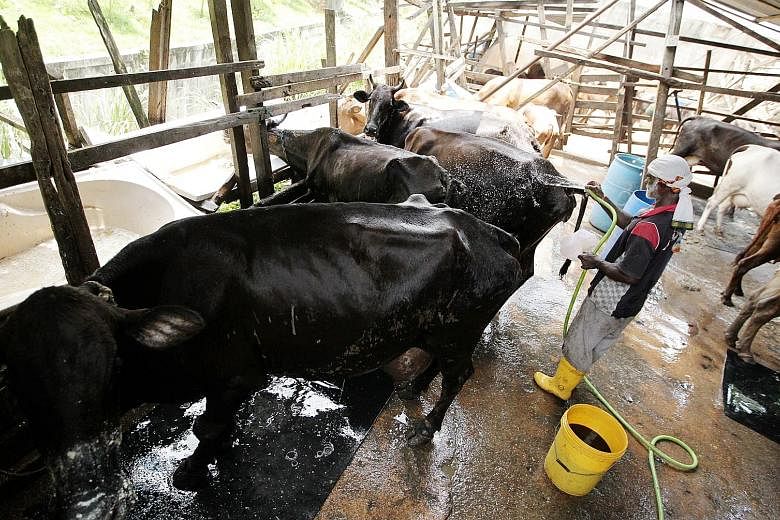PETALING JAYA • The hot weather has taken its toll on Malaysia's reared fish, livestock and fresh produce, as farmers warn of higher food prices in the coming months.
Malaysia's marine fish farming industry, the largest in South-east Asia, has suffered RM20 million (S$6.9 million) in losses due to rising temperatures, said Marine Fish Farmers Association deputy president Mohamed Razali Mohamed.
"Grouper, snapper and barramundi are dying in cages due to the red tide or growth of algae, which competes with the fish for oxygen," he was quoted as saying by The Star newspaper. "Just last month, 100 tonnes of fish worth RM4 million destined for both local and overseas markets were wiped out in fish farms in Pulau Kukup in Johor."
Most of the 2,000 fish farms in the country operate in shallow waters and protected bays, using about 100,000 wooden cages.
In 2014, Malaysia produced 64,000 metric tonnes of marine fish worth RM1.2 billion.
Mr Mohamed Razali said export earnings from grouper and snapper, which are also sold to restaurants in Hong Kong, China and Singapore, amounted to RM400 million annually.
Mr Lee Boon Cheow, president of the Singapore Fish Merchants' General Association, however, downplayed the impact of higher fish prices on Singapore.
"We have many sources to import fish, not just Malaysia. We also get our fish from Indonesia and Thailand. Prices going up and down 10 per cent, 20 per cent - that's common," he said.
On land, pig farmers also fear that the lack of water due to the dry spell could increase the mortality of their livestock which needs to be hosed down daily to keep cool.
"The price of pork is stable now but any impact on the market will be felt in six to eight months," said Mr Tan Kuang Liang, president of the Perak Animal Husbandry Association. He noted that the extreme heat has led to reduced appetite and birth rates among the animals.
Malaysian Federation of Ruminant Breeders Association chairman Samad Kassim, who operates a dairy farm with 300 heads of cattle in Kota Kemuning, Selangor, said milk production was down by 20 to 30 per cent. He pinned the blame on stress induced by the weather.
Farmers have to spend more on supplements and vitamins for their livestock, with grass for feeding wilting under the heat, The Star said.
"Farmers have to absorb these losses. Personally, I have had to spend another RM5,000 or RM6,000 a month on supplements for my cows," said Mr Samad.
Vegetable and fruit growers warned that prices of farm produce are expected to rise as quality falls, if the dry spell persists.
"If there is still no rain, there will be (more) shortage, but the effects will be felt (by consumers) maybe in a month or two," said Mr Chay Ee Mong, secretary of the Cameron Highlands Vegetable Growers Association, adding that rising temperatures have caused pest problems which affect the quality of vegetables.
•Additional reporting by Jalelah Abu Baker

